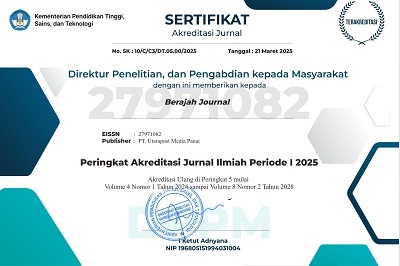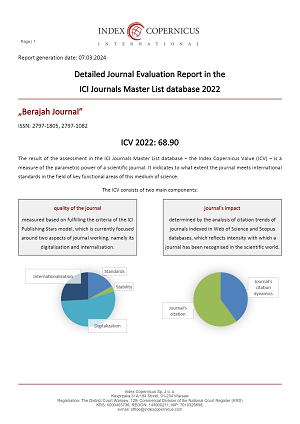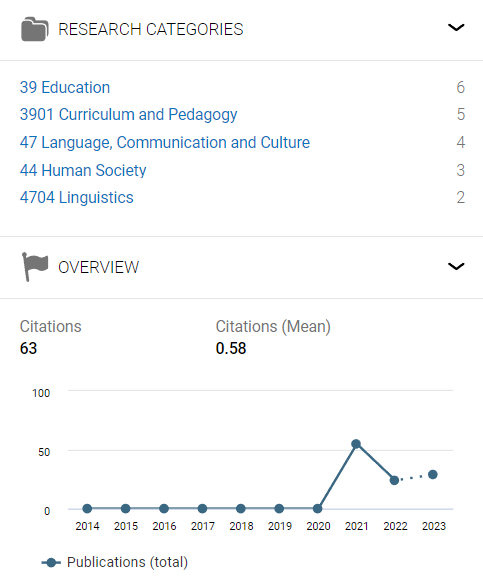TINJAUAN LITERATUR KONDISI PSIKOLOGIS REMAJA PENDERITA KANKER
DOI:
https://doi.org/10.47353/bj.v4i1.292Keywords:
Cancer, quality of life, psychological state, problems, adolescentsAbstract
Adolescent cancer is a significant health problem that can have a serious impact on their lives. Adolescent cancer is influenced by several factors such as genetics, environment, and lifestyle. Other prevention and treatment measures have been identified that facilitate the prevention process. This review aims to provide an understanding of the psychology of adolescents who experience cancer. This study is a narrative review taken from 3 databases namely google scholar, scopus, and sciencedirect and assessed with critical appraisal so that 10 articles were reviewed with 9 quantitative articles and 1 systematic review article. Based on the results of the review, factors that influence the level of distress of adolescents due to cancer, the quality of life of adolescents diagnosed with cancer and the resilience of adolescents with cancer were obtained. Adolescents with cancer face unique challenges in their lives, which affect various aspects, including physical, emotional, social and psychological. Social support from family, peers and community is crucial in helping adolescents overcome the challenges they face. Strong support networks can improve resilience and quality of life. Psychological interventions and psychological support are integral to the care of adolescents with cancer. Counselling, therapy and healthy coping strategies can help them to manage stress, anxiety and depression.
Downloads
References
Afifah, W., & Luawo, M. I. R. (2020). Profil dukungan sosial-psikologis yang dibutuhkan dan Diperoleh orangtua dengan anak sakit kanker (survey di komunitas kantong doraemon). Insight: Jurnal Bimbingan Dan Konseling, 9(1), 94–107.
Bradford, N. K., & Chan, R. J. (2017). Health promotion and psychological interventions for adolescent and young adult cancer survivors: A systematic literature review. Cancer Treatment Reviews, 55, 57–70. https://doi.org/https://doi.org/10.1016/j.ctrv.2017.02.011
Bray, F., Ferlay, J., Soerjomataram, I., Siegel, R. L., Torre, L. A., & Jemal, A. (2018). Global cancer statistics 2018: GLOBOCAN estimates of incidence and mortality worldwide for 36 cancers in 185 countries. CA: A Cancer Journal for Clinicians, 68(6), 394–424. https://doi.org/10.3322/caac.21492
Brierley, M. E. E., Sansom-Daly, U. M., Baenziger, J., McGill, B., & Wakefield, C. E. (2019). Impact of physical appearance changes reported by adolescent and young adult cancer survivors: A qualitative analysis. European Journal of Cancer Care, 28(4), 1–8. https://doi.org/10.1111/ecc.13052
Duan, Y., Wang, L., Sun, Q., Liu, X., DIng, S., Cheng, Q., Xie, J., & Cheng, A. (2021). Prevalence and Determinants of Psychological Distress in Adolescent and Young Adult Patients with Cancer: A Multicenter Survey. Asia-Pacific Journal of Oncology Nursing, 8(3), 314–321. https://doi.org/10.4103/2347-5625.311005
Glidden, C., Howden, K., Romanescu, R. G., Hatala, A., Scott, I., Deleemans, J. M., Chalifour, K., Eaton, G., Gupta, A. A., Bolton, J. M., Garland, S. N., Mahar, A. L., & Oberoi, S. (2022). Psychological distress and experiences of Adolescents and Young Adults with cancer during the COVID-19 pandemic: A cross-sectional survey. Psycho-Oncology, 31(4), 631–640. https://doi.org/10.1002/pon.5849
Haugan, T., Muggleton, S., & Myhr, A. (2021). Psychological distress in late adolescence: The role of inequalities in family affluence and municipal socioeconomic characteristics in Norway. PLoS ONE, 16(7 July), 1–25. https://doi.org/10.1371/journal.pone.0254033
Kusumawaty, I., Yunike, Jawiah, & Rehana. (2021). Family resilience in caring for drug addiction. Gaceta Sanitaria, 35, S491–S494. https://doi.org/10.1016/j.gaceta.2021.10.079
Lea, S., Martins, A., Fern, L. A., Bassett, M., Cable, M., Doig, G., Morgan, S., Soanes, L., Whelan, M., & Taylor, R. M. (2020). The support and information needs of adolescents and young adults with cancer when active treatment ends. BMC Cancer, 20(1), 1–13. https://doi.org/10.1186/s12885-020-07197-2
Lewis, F. M., Zahlis, E. H., Shands, M. E., Griffith, K. A., Goldberger, S., Shaft, A., Kennedy, R., & Rice, A. (2021). A Pilot Feasibility Study of a Group-delivered Cancer Parenting Program: Enhancing Connections-Group. J Psychosoc Oncol, 39(1), 1–16. https://doi.org/10.1080/07347332.2020.1745987.A
Lin, C., Tian, H., Chen, L., Yang, Q., Wu, J., Ji, Z., Zheng, D., Li, Z., & Xie, Y. (2022). The efficacy of cognitive behavioral therapy for cancer: A scientometric analysis. Frontiers in Psychiatry, 13(November), 1–18. https://doi.org/10.3389/fpsyt.2022.1030630
Okado, Y., Long, A., & Phipps, S. (2021). Profiles and predictors of resilient functioning in youths with pediatric cancer history. Journal of Psychosocial Oncology, 39(4), 493–508. https://doi.org/10.1080/07347332.2020.1844843
Okamura, M., Fujimori, M., Goto, S., Obama, K., Kadowaki, M., Sato, A., Hirayama, T., & Ucjitomi, Y. (2022). Prevalence and Associated Factors of Psychological Distress Among Single Fathers in Japan. Palliative and Supportive Care, 21(6), 93–99. https://doi.org/10.2188/jea.JE20210273
Pan, H. T., Wu, L. M., & Wen, S. H. (2017). Quality of Life and Its Predictors among Children and Adolescents with Cancer. Cancer Nursing, 40(5), 343–351. https://doi.org/10.1097/NCC.0000000000000433
Park, E. M., & Rosenstein, D. L. (2015). Depression in adolescents and young adults with cancer. Dialogues in Clinical Neuroscience, 17(2), 171–180. https://doi.org/10.31887/dcns.2015.17.2/epark
Pennant, S., Lee, S. C., Holm, S., Triplett, K. N., Howe-Martin, L., Campbell, R., & Germann, J. (2020). The role of social support in adolescent/young adults coping with cancer treatment. Children, 7(1), 1–25. https://doi.org/10.3390/children7010002
Perloff, T., King, J. C., Rigney, M., Ostroff, J. S., & Johnson Shen, M. (2019). Survivor guilt: The secret burden of lung cancer survivorship. Journal of Psychosocial Oncology, 37(5), 573–585. https://doi.org/10.1080/07347332.2019.1569191
Prikken, S., Luyckx, K., Raymaekers, K., Raemen, L., Verschueren, M., Lemiere, J., Vercruysse, T., & Uyttebroeck, A. (2023). Identity formation in adolescent and emerging adult cancer survivors: a differentiated perspective and associations with psychosocial functioning. Psychology and Health, 38(1), 55–72. https://doi.org/10.1080/08870446.2021.1955116
Qin, L. L., Peng, J., Shu, M. L., Liao, X. Y., Gong, H. J., Luo, B. A., & Chen, Y. W. (2023). The Fully Mediating Role of Psychological Resilience between Self-Efficacy and Mental Health: Evidence from the Study of College Students during the COVID-19 Pandemic. Healthcare (Switzerland), 11(3). https://doi.org/10.3390/healthcare11030420
Reuvers, M. J. P., Gedik, A., Way, K. M., Elbersen-van de Stadt, S. M., van der Graaf, W. T. A., & Husson, O. (2023). Caring for Adolescents and Young Adults (AYA) with Cancer: A Scoping Review into Caregiver Burdens and Needs. Cancers, 15(12), 1–24. https://doi.org/10.3390/cancers15123263
Siegel, R. L., Miller, K. D., Wagle, N. S., & Jemal, A. (2023). Cancer statistics, 2023. CA: A Cancer Journal for Clinicians, 73(1), 17–48. https://doi.org/10.3322/caac.21763
Siegwart, V., Benzing, V., Spitzhuettl, J., Schmidt, M., Grotzer, M., Steinlin, M., Leibundgut, K., Roebers, C., & Everts, R. (2022). Cognition, psychosocial functioning, and health-related quality of life among childhood cancer survivors. Neuropsychological Rehabilitation, 32(6), 922–945. https://doi.org/10.1080/09602011.2020.1844243
Sonmez, Y., Akdemir, M., Meydanlioglu, A., & Aktekin, M. R. (2023). Psychological Distress, Depression, and Anxiety in Nursing Students: A Longitudinal Study. Healthcare (Switzerland), 11(5), 1–11. https://doi.org/10.3390/healthcare11050636
Toporcov, T. N., & Filho, V. W. (2018). Epidemiological science and cancer control. Clinics, 73, e627s. https://doi.org/https://doi.org/10.6061/clinics/2018/e627s
Tough, D., Robinson, J., Gowling, S., Raby, P., Dixon, J., & Harrison, S. L. (2018). The feasibility, acceptability and outcomes of exergaming among individuals with cancer: A systematic review. BMC Cancer, 18(1), 1–16. https://doi.org/10.1186/s12885-018-5068-0
Werk, R. S., & Ford, J. S. (2021). Covariates of risky health behaviors in pediatric cancer survivors during adolescence. Journal of Psychosocial Oncology, 39(1), 74–88. https://doi.org/10.1080/07347332.2020.1795779
Yusuf, A., Sulaihah, S., Nihayati, H. E., Suhron, M., Hari Basuki, N., Mundakir, & Yunitasari, E. (2020). The role of families caring for people with mental disorders through family resilience at East Java, Indonesia: Structural equation modeling analysis. Systematic Reviews in Pharmacy, 11(9), 52–59. https://doi.org/10.31838/srp.2020.9.10
Zannas, A. S., & West, A. E. (2014). Epigenetics and the regulation of stress vulnerability and resilience. Neuroscience, 264, 157–170. https://doi.org/10.1016/j.neuroscience.2013.12.003
Zhang, Y., Li, W., Zhang, Z., Sun, H., Garg, S., Yang, Y., & Wang, H. (2020). Suicidal Ideation in Newly-Diagnosed Chinese Cancer Patients. Frontiers in Psychiatry, 11(July), 1–8. https://doi.org/10.3389/fpsyt.2020.00708
Downloads
Published
How to Cite
Issue
Section
License
Copyright (c) 2024 Yunike Yunike, Ira Kusumawaty, Mulya Virgonita Iswindari Winta

This work is licensed under a Creative Commons Attribution 4.0 International License.




























